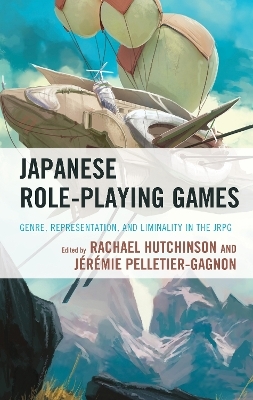
Japanese Role-Playing Games
Lexington Books (Verlag)
978-1-7936-4354-4 (ISBN)
Japanese Role-playing Games: Genre, Representation, and Liminality in the JRPG examines the origins, boundaries, and transnational effects of the genre, addressing significant formal elements as well as narrative themes, character construction, and player involvement. Contributors from Japan, Europe, North America, and Australia employ a variety of theoretical approaches to analyze popular game series and individual titles, introducing an English-speaking audience to Japanese video game scholarship while also extending postcolonial and philosophical readings to the Japanese game text. In a three-pronged approach, the collection uses these analyses to look at genre, representation, and liminality, engaging with a multitude of concepts including stereotypes, intersectionality, and the political and social effects of JRPGs on players and industry conventions. Broadly, this collection considers JRPGs as networked systems, including evolved iterations of MMORPGs and card collecting “social games” for mobile devices. Scholars of media studies, game studies, Asian studies, and Japanese culture will find this book particularly useful.
Rachael Hutchinson is professor of Japanese studies at the University of Delaware. Jérémie Pelletier-Gagnon is postdoctoral researcher at Université du Québec à Montréal.
Acknowledgments
A Note on Names and Sources
List of Figures and Tables
Introduction
Jérémie Pelletier-Gagnon and Rachael Hutchinson
Part One: Genre
Chapter 1: Evolution of a Genre: Dragon Quest and the JRPG
Yuhsuke Koyama
Chapter 2: Japan’s Hard(ware) Power: Consoles, Culture, and the Mass Appeal of Japanese Role-Playing Games
Nökkvi Jarl Bjarnason
Chapter 3: Tutorial Characters and Rhetorical Strategies: Comparing Mother and Final Fantasy
Fanny Barnabé
Chapter 4: Challenging Linearity: Microstructures and Meaning-making in Trails of Cold Steel III
Joleen Blom
Chapter 5: “Is JRPG Old Fashioned?”: Genre, Circulation, and Identity Crisis in Black Rock Shooter: The Game
Jérémie Pelletier-Gagnon
Part Two: Representation
Chapter 6: Harmonized Dissonance: Parodies of Japan’s America in Earthbound
Benjamin Whaley
Chapter 7: From Cleric to Daemon: Narrative and Ludic Agencies of Female Characters in the Tales of Series
Loïc Mineau-Murray
Chapter 8: Beyond Status Effects: Disability and Japanese Role-Playing Games
Andrew Campana
Chapter 9: Empathy for the Blind: Negotiating Disability in Final Fantasy XV
Rachael Hutchinson
Chapter 10: Everyday Aesthetics and Social Reform in Persona 5
Frank Mondelli
Part Three: Liminality
Chapter 11: Creating Community in Persona 3: Japanese Role-playing Games as Networked Practice
Douglas Schules
Chapter 12: Networked Asymmetry: Uncanny Traces in the Dark Souls Series
Daniel Johnson
Chapter 13: Pseudo-allegory in Final Fantasy XIV
William Huber
Chapter 14: Traces of Change in JRPG History: Mythological Thinking in Fate / Grand Order and Pokémon GO
Daichi Nakagawa
About the Contributors
| Erscheinungsdatum | 18.03.2022 |
|---|---|
| Co-Autor | Fanny Barnabé, Nökkvi Jarl Bjarnason, Joleen Blom |
| Verlagsort | Lanham, MD |
| Sprache | englisch |
| Maße | 161 x 227 mm |
| Gewicht | 703 g |
| Themenwelt | Geisteswissenschaften ► Geschichte ► Regional- / Ländergeschichte |
| Informatik ► Weitere Themen ► Computerspiele | |
| Sozialwissenschaften ► Kommunikation / Medien ► Medienwissenschaft | |
| ISBN-10 | 1-7936-4354-7 / 1793643547 |
| ISBN-13 | 978-1-7936-4354-4 / 9781793643544 |
| Zustand | Neuware |
| Haben Sie eine Frage zum Produkt? |
aus dem Bereich


